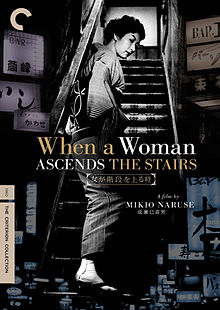- When a Woman Ascends the Stairs
-
When a Woman Ascends the Stairs 
Criterion Collection DVD coverDirected by Mikio Naruse Produced by Ryuzo Kikushima Written by Ryuzo Kikushima Starring Hideko Takamine
Masayuki Mori
Daisuke KatoMusic by Toshiro Mayuzumi Cinematography Masao Tamai Editing by Eiji Ooi Distributed by Toho Release date(s)  January 15, 1960
January 15, 1960
 June 25, 1963
June 25, 1963Running time 111 min Country Japan Language Japanese When a Woman Ascends the Stairs (女が階段を上る時 Onna ga kaidan wo agaru toki) is a 1960 Japanese drama film directed by Mikio Naruse.
Keiko, a young widow, becomes a bar hostess in Ginza to make ends meet. The story recounts the struggles to maintain her independence in a male-dominated society. She projects ease and grace but the audience knows how tormented she really is - they also know how much rent she has to pay and the cost of her nephew's operation.'[1]
Contents
Plot
Keiko (called Mama by the other characters), a young widow approaching 30, is a hostess at a bar in Ginza. Realizing she is losing her looks, she decides after talking to her bar manager, Komatsu, that she wants to open her own bar rather than remarrying and dishonoring her late husband to whose memory she is still devoted. To accomplish this, she must secure loans from some of the affluent patrons who frequent her bar, but is unwilling to lead them on for the sake of money.
Meanwhile, a former employee, Yuri, has opened up a bar of her own nearby, subsequently taking away most of Keiko's former customers. She scouts locations for her own bar with a confidant of her bar, Junko, undecided as to where she will open up. While Keiko is having lunch with Yuri and thinking she is doing well in her enterprise, she reveals that she is deep in debt, and cannot afford to pay off her creditors. She tells Keiko of a plan to fake a suicide to keep her creditors at bay. Keiko is shocked to learn the next day that Yuri has died, and that she had either planned her death all along, or had merely misjudged the amount of sleeping pills to take. She is again shocked to see Yuri's creditors dunning her family for money while still in mourning.
After Keiko suffers an unnamed bout of sickness, she retreats to the home of her family to recover. It is revealed that she must give them money to keep her brother out of jail, while also paying for an operation that her nephew needs (who is suffering from polio) in order to walk again. After telling them she can not afford to give them money as she must keep up appearances with an expensive apartment and kimonos, Keiko reluctantly agrees, realizing this will forestall any plan to open her own bar.
After returning to her bar to work, she is made a proposal to by a heavy-set man, who Keiko entertains briefly. When he turns out to be a fraud, she sets her sights on Fujisaki, a businessman who is interested in her. While promising to give her money after sleeping with her, he tells her he has been transferred to Osaka for work, and cannot abandon his family. Jilted and abandoned, Keiko despairs until Komatsu reprimands her for her dependence on men, for her resolve and reluctance to give in to the men had made him fall in love with her. Losing his interest, he quits the bar. Keiko returns to work, pretending to be happy.
Cast
- Hideko Takamine ... Keiko Yashiro
- Masayuki Mori ... Nobuhiko Fujisaki
- Reiko Dan ... Junko Inchihashi
- Tatsuya Nakadai ... Kenichi Komatsu, Keiko's manager
- Daisuke Kato ... Matsukichi Sekine
- Ganjiro Nakamura ... Goda
- Eitaro Ozawa ... Minobe
- Keiko Awaji ... Yuri
- Kyu Sazanka ... Bar owner
- Noriko Sengoku ... Fortune-teller
Themes
Naruse once remarked; ' From the youngest age, I have thought that the world we live in betrays us; this thought still remains with me.'
DVD release
In 2007, The Criterion Collection released a one disc Region 1 edition. Special features included audio commentary by Donald Richie, a new interview with Tatsuya Nakadai, the theatrical trailer and new English subtitle translation. The edition also included a booklet containing essays by Phillip Lopate, Catherine Russell, Audie Bock, and Hideko Takamine.
References
- ^ Geoffrey Macnab "Director Mikio Naruse:An overlooked master", The Independent 29 June 2007
External links
- When a Woman Ascends the Stairs at the Internet Movie Database
- When a Woman Ascends the Stairs at AllRovi
- (Japanese) When a Woman Ascends the Stairs at the Japanese Movie Database
- Reviews at Rotten Tomatoes
- Criterion Collection essay by Phillip Lopate
Films directed by Mikio Naruse Love Is Strength (1930) · Hideko the Bus-Conductor (1941) · Ginza Cosmetics (1951) · Repast (1951) · Mother (1951) · Lightning (1952) · Older Brother, Younger Sister (1953) · Sound of the Mountain (1954) · Late Chrysanthemums (1954) · Floating Clouds (1955) · Sudden Rain (1956) · A Wife's Heart (1956) · Flowing (1956) · Aruse (1957) · When a Woman Ascends the Stairs (1960) · Autumn Has Already Started (1960) · A Wanderer's Notebook (1962) · Yearning (1964)
Categories:- 1960 films
- Japanese films
- Japanese-language films
- Japanese drama films
- 1960s drama films
- Black-and-white films
- Films directed by Mikio Naruse
- 1960s Japanese film stubs
Wikimedia Foundation. 2010.
